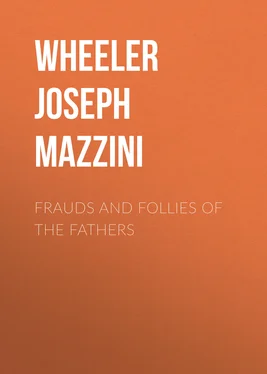Joseph Wheeler - Frauds and Follies of the Fathers
Здесь есть возможность читать онлайн «Joseph Wheeler - Frauds and Follies of the Fathers» — ознакомительный отрывок электронной книги совершенно бесплатно, а после прочтения отрывка купить полную версию. В некоторых случаях можно слушать аудио, скачать через торрент в формате fb2 и присутствует краткое содержание. Жанр: foreign_prose, foreign_religion, Философия, foreign_psychology, foreign_antique, на английском языке. Описание произведения, (предисловие) а так же отзывы посетителей доступны на портале библиотеки ЛибКат.
- Название:Frauds and Follies of the Fathers
- Автор:
- Жанр:
- Год:неизвестен
- ISBN:нет данных
- Рейтинг книги:5 / 5. Голосов: 1
-
Избранное:Добавить в избранное
- Отзывы:
-
Ваша оценка:
- 100
- 1
- 2
- 3
- 4
- 5
Frauds and Follies of the Fathers: краткое содержание, описание и аннотация
Предлагаем к чтению аннотацию, описание, краткое содержание или предисловие (зависит от того, что написал сам автор книги «Frauds and Follies of the Fathers»). Если вы не нашли необходимую информацию о книге — напишите в комментариях, мы постараемся отыскать её.
Frauds and Follies of the Fathers — читать онлайн ознакомительный отрывок
Ниже представлен текст книги, разбитый по страницам. Система сохранения места последней прочитанной страницы, позволяет с удобством читать онлайн бесплатно книгу «Frauds and Follies of the Fathers», без необходимости каждый раз заново искать на чём Вы остановились. Поставьте закладку, и сможете в любой момент перейти на страницу, на которой закончили чтение.
Интервал:
Закладка:
Here is an interesting quotation by the earliest Christian Father of words uttered by God Incarnate upon an important matter. Had they found their way into the Canonical Gospels, what books would have been written upon their beauty and sublimity! As it is, we gather from Clement of Alexandria 4 4 "Stromata," book ill-, 9, 13. The English editors have deemed it best to give the whole of this book in Latin.
that these words and other important sayings of Jesus were found in the Gospel of the Egyptians. This gospel was certainly an ancient one, and is supposed by Grabe, Erasmus, Du Pin, Father Simon, Grotius, Mills, and others, to have been among those referred to by Luke in his preamble: "Forasmuch as many have taken in hand to set forth in order a declaration of those things which are most surely believed among us." This Gospel of the Egyptians was received by the Ophites, the Encratites, the Valentinians, and the Sabellians. It was evidently at one with the doctrines of the Essenes in regard to women. For instance, Clement of Alexandria quotes from it the following: "The Lord says to Salome: 'Death shall prevail as long as women bring forth children.'" "I am come to destroy the works of the woman, that is, the works of female concupiscense, generation, and corruption. When you despise a covering for your nakedness, and when two shall be one, and the male with the female neither male nor female." Intimations that similar views regarding marriage were found in the early Christian Church may be gathered from Matt, xix., 12; Rev. xiv., 4; 1 Cor. vii., 8, etc. But the subject is too delicate to be handled by other than a divinity student.
Passing, then, Clement's two epistles to virgins with the remark that although generally rejected as spurious by Protestants, they are considered genuine by their editors, Wetstein, Bellet, and Cardinal Villecourt, we come to "The Recognitions of Clement." Of these remarkable documents Hilgenfeld says, "There is scarcely a single writing which is of so great importance for the history of Christianity in its first stage." The editors of the Anti-Nicene Christian Library call it "a theological romance;" but it is a question whether that epithet would not equally fit every other so-called historical composition of the first three centuries of the Christian era. Cardinal Baronius ("Annal." tom, i., an. 51) call sit "a gulf of filth and uncleanliness, full of prodigious lies and frantic fooleries." But Cardinal Beliarmine says it was written either by Clement or by some other author as ancient and learned as he.
It begins, "I, Clement, who was born in the city of Rome," and proceeds to narrate his thoughts on philosophy, his doubts and hopes of a future life. To resolve these the worthy Father determined to go to Egypt, and bribe a magician to bring him a soul from the infernal regions to consult whether the soul be immortal. But he heard of the Son of God in Judea and was ready to accredit the wonders ascribed to him. Having heard Barnabas, Clement proceeds to Cæsarea and sees Peter, who instructs him concerning the True Prophet. And now comes the curious part of the story. Peter is engaged in continuous controversy on the true Mosaic and Christian religion with a miracle worker, called Simon the magician, who it is said confessed he wrought his wonders by the help of the soul of a healthy young boy, who had been violently put to death for that purpose, and then called up from the dead and compelled to be his assistant. Peter follows this Simon about from place to place, exposing him. He especially follows him to Rome. The astounding revelation in connexion with this story we give in the words of the author of "Supernatural Religion" (vol. ii., p. 34): "There cannot be a doubt that the Apostle Paul is attacked in it, as the great enemy of the true faith, under the hated name of Simon the magician, who Peter followed everywhere for the purpose of unmasking and confuting him. He is robbed of the title of 'Apostles of the Gentiles,' which, together with the honor of founding the Churches of Antioch, of Laodicea, and of Rome, is ascribed to Peter. All that opposition to Paul which is implied in the Epistle to the Galatians and elsewhere (1 Cor. i., 11, 12; 2 Cor. xi., 13—20; Philip i., 15, 16) is here realised and exaggerated, and the personal difference with Peter to which Paul refers is widened into the most bitter animosity."
The most able authorities, such as Davidson, B. Lightfoot, Mansel, Hilgenfeld, Reuss, Baur, Scholten, and Schwegler agree in this view, which is strongly confirmed by the epistle of Peter to James, which stands as a preface to the Clementine Homilies, dealing with the same matter of Simon Magus. Peter says: "For some among the Gentiles have rejected my lawful preaching, and accepted certain lawless and foolish teaching of the hostile man." Canon Westcott, in his edition of 1866, said on this passage: "There can be no doubt that St. Paul is referred to as 'the enemy'" (on the Canon, p. 252). Since the quotation of this damaging admission by the author of "Supernatural Religion," it has been removed. But whether the fact that the Simon Magus who is reviled in the Clementine Recognitions is intended to represent Paul has the authority of Canon Westcott or not, there can be no doubt that this view better agrees with Paul's epistles, and all we know of the early Christians, than the reconciling but unhistoric "Acts of the Apostles," which took the place of the Clementine "theological romance," because, in the struggle for existence, the Christian Church which was built on Paul rather than that which was built on Peter (Matt. xvi., 18), proved to be the fittest to survive.
II
St. Barnabas is the next of the Apostolic Fathers demanding our attention. Here, again, it is very doubtful if we have any of the authentic words of the companion of Paul, so highly extolled by Renan, and declared by the author of the Acts of the Apostles to have been "a good man, and full of the Holy Ghost and of faith" (xi., 24).
The epistle ascribed to St. Barnabas, although generally received as his for many ages, and repeatedly cited as Apostolic by Clement of Alexandria, and also cited by Origen, and found, together with the "Shepherd" of Hermas, in the Sinaitic Codex, is repudiated by most modern scholars, and declared by the author of "Supernatural Religion" to be an instance of "the singular facility with which, in the total absence of critical discrimination, spurious writings were ascribed by the Fathers to Apostles and their followers" (vol. i., p. 233, 1879). Although the weight of authority is against its authenticity, it is still supported as genuine by such scholars as Schmidt, Grieseler, and Samuel Sharpe; and it must be admitted that most of the arguments used against it have been based upon its contents not coming up to what critics have supposed ought to be the Apostolic standard. At any rate, it is an-interesting relic of the early Church which is considered genuine by the most important section of Christendom, the Roman Catholics. In Jerome's time it was still read among the Apocryphal Scriptures, and in the Stichometria of Nicephorus (ninth century) it is put among the disputed books of the New Testament.
Barnabas is still more questionably fathered with a gospel of his own, which is no longer extant. But as it appears to have contained a very peculiar statement to the effect that Jesus did not actually die upon the cross, and that it was Judas who was crucified in his stead, which statement has been taken up, from whatever quarter, by the Mohammedans, this gospel is, of course, set down as a Mohammedan forgery.
The Catholics have a tradition that Barnabas was converted after witnessing the miracle at that wondrous pool of Bethesda, where the angel came down troubling the waters. He was a Levite of Cyprus, and his name was formerly Joses. It is noteworthy that upon entering the Church, Christian converts took new names, a custom common to the Buddhists. Clement of Alexandria says he was one of the seventy Apostles. He is stated to have converted Clement of Rome, and to have been stoned by the Jews about the year 64. All these statements rest on the mere authority of the Church, not the slightest proof being forthcoming either for or against them. Nothing was known of his tomb until the year 478, when the Cypriotes, being required to submit to the episcopal sway of Peter the Fuller, Patriarch of Antioch, his coffin, with the Gospel of Saint Matthew inside, turned up in the nick of time to avert the calamity and assert the independence of a place having such indubitable relics. The Church of Toulouse yet claims to have his body, and eight or nine churches pretend to having possession of his head. Of the value of this wondrous head we shall presently have sufficient proof.
Читать дальшеИнтервал:
Закладка:
Похожие книги на «Frauds and Follies of the Fathers»
Представляем Вашему вниманию похожие книги на «Frauds and Follies of the Fathers» списком для выбора. Мы отобрали схожую по названию и смыслу литературу в надежде предоставить читателям больше вариантов отыскать новые, интересные, ещё непрочитанные произведения.
Обсуждение, отзывы о книге «Frauds and Follies of the Fathers» и просто собственные мнения читателей. Оставьте ваши комментарии, напишите, что Вы думаете о произведении, его смысле или главных героях. Укажите что конкретно понравилось, а что нет, и почему Вы так считаете.











